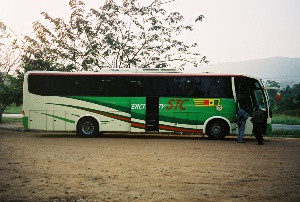Today hounds have established that there is uneasy calm among staff and workers of the ailing Intercity State Transport Company (STC) concerning the imminent offloading of the 80 per cent stake of the Social Security & National Insurance Trust (SSNIT) from the company.
The valuation of the company and modalities for offloading the shares by SSNIT are expected to be finalized after a series of meetings between the parties involved, sources indicate.
Earlier last month, STC officials made a plea to SSNIT to invest capital in the company or sell-off to a new investor ready to inject resources.
“We have held some discussions with SSNIT, and as it stands now they are not interested in the company anymore; they want to sell,” a senior official of the transport company said in an exclusive interview with Today.
Many of the workers, Today gathered, are uncertain about their fate if and when this deal is pulled through with some intimating they dread being re-trenched since that is what usually goes on when there is a new investor.
SSNIT’s move is seen as a response to STC’s appeal, but is also possibly linked to the ongoing rationalization of the pensions-manager’s investments, which cut across the financial, real-estate, energy and transport sectors.
SSNIT, this paper learnt after acquiring a controlling stake in the company from VANEF in 2001, has neither injected a significant capital into the ailing transport company nor restructured its finances, operations and administration.
This has led to a steady decline in revenue and the eroding of the company’s working capital, plunging it into debt.
The state owns a minority 20 per cent stake in STC, whose current debts stand at GH¢40 million.
The workers told Today that the company’s situation is not helped by the fact that the government, the minority shareholder, virtually runs the company with SSNIT assuming a secondary role.
“The purchase of 45 FAW buses in 2005 is what has brought STC to its knees. We borrowed so much money from the NIB to purchase the FAW buses, but they did not last for two years. Those buses were not tested, and nor was it prototype tried.
Under the normal procedure, we were supposed to be given at least two buses to try out. The company’s engineers were not involved in the purchase of the FAW buses. The buses disappointed us a lot,” the source said.
“In 2005 when the FAW buses were acquired, STC used to make about GH¢45,000 from the Accra branch alone, and could do 16 services from Accra to Kumasi.
For the entire country, we used to make GH¢35, 000 for the entire country.”
Another source told this paper that “the fortunes of the once vibrant transport company will continue to hang in the balance until an investor ready to invest new resources and capital takes it over.”
“STC’s net worth dwindled from GH¢10.9 billion in 2009, and will continue to remain in the red if not salvaged,” the source added.
General News of Saturday, 7 April 2012
Source: Today

















